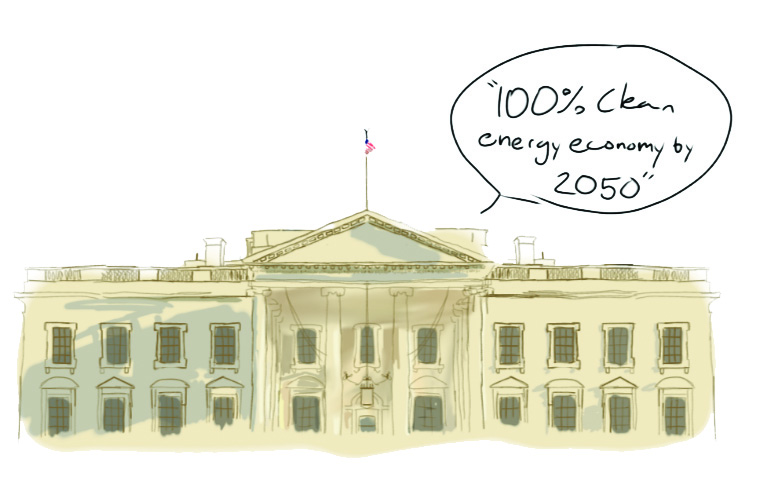In August the Trump administration announced significant changes to the ways in which the Endangered Species Act is applied. These modifications were derided by environmentalists as a considerable weakening of the nation’s most critical conservation law. Environmental groups also allege that these changes will make it far more difficult to protect multiple wildlife species from the threats posed by global climate change.
The Endangered Species Act, passed in 1973 with nearly unanimous bipartisan support and signed into law by Republican President Richard Nixon, has been credited with saving the grizzly bear, American alligator, Florida manatee and bald eagle from the edge of extinction. In Washington, 49 species are protected under the Act, including southern resident orca whales, pygmy rabbits and several species of salmon.
The Act requires all federal agencies to consult with the Fish and Wildlife Service or the National Oceanic and Atmospheric Administration Fisheries Service to ensure any actions that they take do not threaten the existence of listed, federally protected species. Additionally, their actions may not destroy or adversely affect habitats that have been designated as critical to these federally protected species.
While Congress has the authority to change the provisions of the law, it is up to the executive branch to determine the technical parameters with which it is enforced. These parameters often vastly alter the power of the legislation’s provisions.
The Act’s effectiveness rests on clear, consistent and efficient implementation. An effectively administered Act ensures more resources can go where they will do the most good: on-the-ground conservation.
— David Bernhardt
Under the changes, implemented in September, it is far easier to remove a species from the endangered list, and species that are regarded as threatened, one step below endangered, have had their protections notably reduced. Plants and animals newly designated as threatened have had their blanket protections done away with in favor of requiring preservation measures tailored to the individual species.
Federal regulators are now also allowed to incorporate an economic perspective in their assessment on whether a species warrants protection. For example, a decrease in revenue from a mining operation that would be prohibited if a species in a certain area was added to the endangered species list could be considered when federal officials decide to issue federal protection to the species.
Previously, determinations on whether to protect a species had to be made with the consideration of purely scientific information. The Act states that all of these decisions must be made “without reference to possible economic or other impacts of determination.”
The current assistant director for endangered species within the Fish and Wildlife Service, Gary Frazer, said the prohibition on economic considerations has been made for the sake of transparency in the Act’s enforcement. According to the administration, economic analyses will be made purely for informational purposes, as decisions determining whether to list a species as federally protected will still be made on the basis of scientific data.
Perhaps the most visible change in the enforcement of the Endangered Species Act is the administration making it more difficult for regulators to factor in climate change and its effect on wildlife when making decisions on which species need protection. This is because effects on endangered species resulting from climate change tend to be decades away rather than immediate threats, and thus are more difficult to use as justification for protecting species under the changes in enforcement rules.
Ultimately, the changes to the Act appear to make it far easier to for oil and gas drilling, mining and other development projects to take place in areas that are currently home to federally protected species, especially in the western states.
In response to the administration’s announcement, Senator Tom Udall of New Mexico said Democrats in the Senate were considering invoking the Congressional Review Act of 1996, which gives Congress wide-reaching authority to invalidate rules made by federal regulatory agencies. Udall is the top Democrat on the Senate Subcommittee on Interior, overseeing the Interior Department’s budget.
Republican party legislators in both chambers of Congress have long sought to reduce the authority of the Endangered Species Act, claiming that it unnecessarily burdens landowners and industry, and thus is a restriction on economic development. Interior Secretary David Bernhardt, a former lobbyist for the oil industry, has claimed that the Act puts “an unnecessary regulatory burden” on American companies when it is efficiently administered.
“The Act’s effectiveness rests on clear, consistent and efficient implementation. An effectively administered Act ensures more resources can go where they will do the most good: on-the-ground conservation,” Bernhardt said.
A popular talking point among the act’s detractors is that once a species is added to the federal protection list, it is highly unlikely for it to be removed. Over 1,650 species have been added to the list as threatened or endangered since 1973, but only 47 of those have been removed from the list due to a clear population growth since the species was added. Thus, detractors claim that the provisions of the Act do not reasonably take the interests of developers into account.
Weakening of the Endangered Species Act in any way is profoundly unwise in this day and age.
— Henry Belanger
Environmentalists and the defenders of the Act’s previously enforced provisions have levied much of their criticism against the administration limiting the extent to which the effects of climate change can drive federal conservation efforts.
Chiefly cited among these concerns is a recent United Nations report prepared by over 100 experts from 52 countries warning that human activity is poised to drive over one million species into extinction during the coming decades if conservation efforts are not taken more seriously. These mass extinctions, according to the report, will be driven by a lack of environmental stewardship and mass industrialization, which have both contributed to a significant loss in nature across the globe.
The UN assessment found that the average abundance of native plant and animal life has fallen by over 20 percent in most major land habitats on every continent. Climate change, combined with levels of farming, logging, fishing and mining unprecedented in human history, is pushing an ever greater number of species toward extinction by shifting or shrinking the climates in which plants and animals evolved to survive.
One of the ways in which the changes make it more difficult for the effects of climate change to be considered in relation to protecting species with the Act is by giving government agencies much more discretion in determining what constitutes the foreseeable future” in terms of environmental impacts. Thus, regulators need not take the effects of possible extreme heat, drought and rising sea levels, among other future consequences of climate change in the next few decades, into account when determining the federal protection status of species.
The Fish and Wildlife Service defended these changes by arguing that the agency wished to avoid making speculative decisions based on the effects of events that are “far into the future.”
Senior Henry Belanger, the Secretary of Terrace’s Ecology Club, believes that attempts by the administration to undermine the Endangered Species Act are severely misguided under the threats from global climate change and the possibility of mass extinction connected to it.
“Weakening of the Endangered Species Act in any way is profoundly unwise in this day and age,” Belanger said.
Biology teacher Jonathan Tong feels that the changes will be devastating to the environment in the coming decades as the long-term effects of climate change become ever more apparent.
“There is a UN report warning that at least one million species of plants and animals are at risk of extinction within the next few decades, within my lifetime,” Tong said. It’s not the same level of mass extinction as during the time of the dinosaurs…but it will have disastrous consequences on food webs and biomes and ecosystems all over. There will be disastrous effects on plants and animals that we depend on for food, medicines and building materials.”
Tong has cultivated an activist community of students at Terrace as part of the global Fridays for Future movement started by Swedish climate activist Greta Thunberg. The group of students, many of whom are in Tong’s classes, seek to pressure Washington state and the country as a whole into doing more to limit the planet’s warming and prevent ecological catastrophe. The group’s website, www.revolutionusa.org, seeks to reach out to like-minded youth across the nation to organize for progressive change.
There is a UN report warning that at least one million species of plants and animals are at risk of extinction within the next few decades, within my lifetime.
— Jonathan Tong
Criticisms of the rollbacks are certainly not limited to individuals or advocacy groups. California Attorney General Xavier Becerra threatened to sue the Trump administration over the weakening of the Act soon after it was announced.
On Wednesday, Sept. 25, Washington’s Attorney General Bob Ferguson joined a multi-state coalition in filing a lawsuit challenging the changes. He claimed that the rollbacks would make it far more likely endangered species in Washington could lose federal protections before the full recovery of their populations.
“For more than four decades, the Endangered Species Act has been a worldwide model of conservation law,” Ferguson said. “This administration has shown over and over that it will stop at nothing to slash regulations at the whim of industry interests, even if it means putting our shared ecosystem at risk.”
The coalition filing the lawsuit in the District Court for the Northern District of California contains 17 states, the District of Columbia and New York City, and it is led by California, Massachusetts and Maryland.
The federal officials and agencies being sued include Bernhardt, Commerce Secretary Wilbur Ross, the Fish and Wildlife Service and NOAA Fisheries Service. The lawsuit alleges that the new rules arbitrarily limit when actions taken by federal agencies resulting in the destruction of critical habitats can be deemed harmful, eliminate recovering a species’ population as a crucial basis for removing it from the endangered list and make it more difficult to designate areas as critical habitats.













